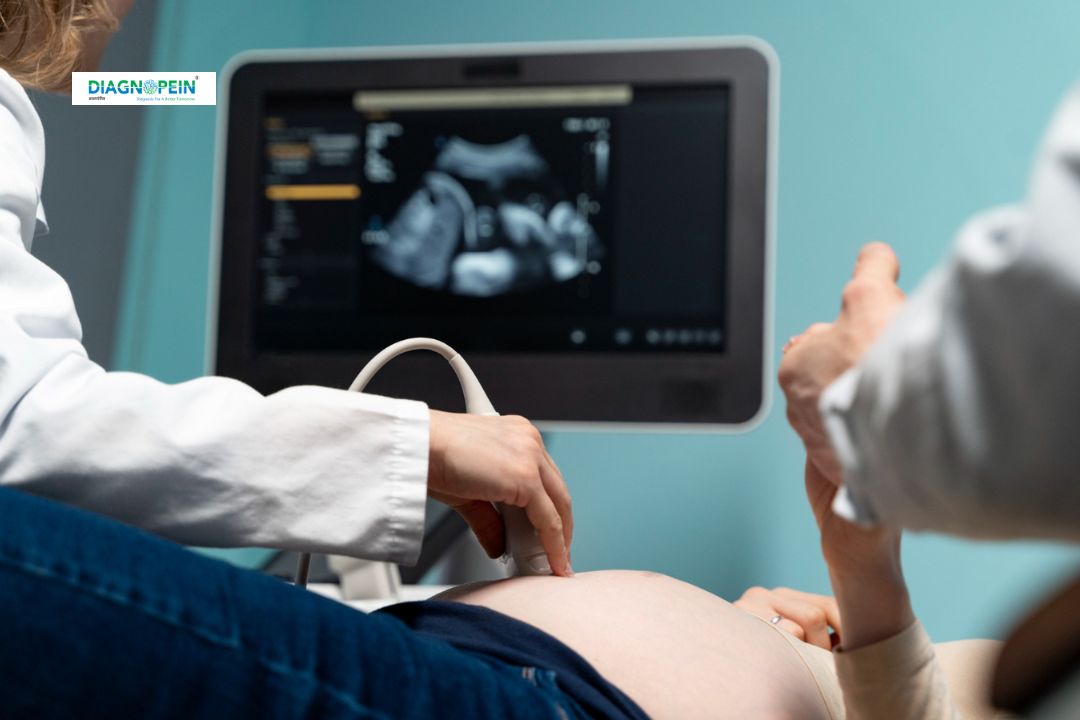Why USG Growth Scan, BPP & Doppler is Important
The USG Growth Scan measures parameters like the baby’s head circumference, abdominal circumference, femur length, and estimated fetal weight. This helps assess whether the fetus is growing properly according to gestational age.
The Biophysical Profile (BPP) evaluates the baby’s well-being through ultrasound and includes parameters such as fetal breathing movement, body movement, tone, and amniotic fluid volume. It provides a score that reflects the baby’s overall health condition.
The Fetal Doppler Ultrasound measures blood flow through the umbilical cord, placenta, and various fetal blood vessels. This helps to check if oxygen and nutrients are reaching the baby efficiently.
By combining these three components, the USG Growth Scan, BPP & Doppler test provides a comprehensive evaluation. It helps in timely detection of growth restrictions, placental insufficiency, and other complications that may require medical intervention or close monitoring.
Benefits of USG Growth Scan, BPP & Doppler
-
Detects fetal growth abnormalities early.
-
Monitors the baby’s oxygen and nutrition supply.
-
Evaluates the functioning of the placenta and umbilical cord.
-
Reduces the risk of unexpected pregnancy complications.
-
Helps in planning safe delivery timing in high-risk pregnancies.
-
Non-invasive and completely safe for mother and baby.
This scan gives both the doctor and parents confidence about the baby’s condition and helps ensure that pregnancy management is done with maximum care.
How the Test is Done
The USG Growth Scan, BPP & Doppler test is performed using advanced ultrasound technology. The mother lies on the examination bed, and a special gel is applied to her abdomen. The transducer (probe) is moved gently over the skin to capture real-time images of the baby inside the womb.
The test usually takes about 30–45 minutes based on fetal position and the specific parameters being assessed. There is no discomfort, and fasting or special preparation is generally not required unless advised by the radiologist.
Qualified radiologists or sonologists interpret the results and share the findings with your gynecologist for further management or follow-up.
Parameters Studied in USG Growth Scan, BPP & Doppler
Growth Scan parameters:
-
Biparietal Diameter (BPD)
-
Head Circumference (HC)
-
Abdominal Circumference (AC)
-
Femur Length (FL)
-
Estimated Fetal Weight (EFW)
BPP parameters:
-
Fetal breathing movements
-
Gross body movements
-
Fetal tone
-
Amniotic Fluid Index (AFI)
-
Non-stress test (if applicable)
Doppler parameters:
-
Umbilical Artery (UA) indices
-
Middle Cerebral Artery (MCA) pulsatility index
-
Ductus Venosus (DV) flow
-
Uterine Artery Doppler
-
Placental resistance and perfusion
Each of these readings helps the clinician assess if the fetus is thriving inside the womb or if early medical intervention might be beneficial.
When to Get a USG Growth Scan, BPP & Doppler Done
Doctors generally recommend this test between 28 and 38 weeks of pregnancy. It can be repeated in high-risk or complicated cases to monitor fetal condition over time. Expecting mothers with hypertension, gestational diabetes, previous growth-restricted babies, or placental issues should discuss the ideal timing and frequency with their gynecologist.








